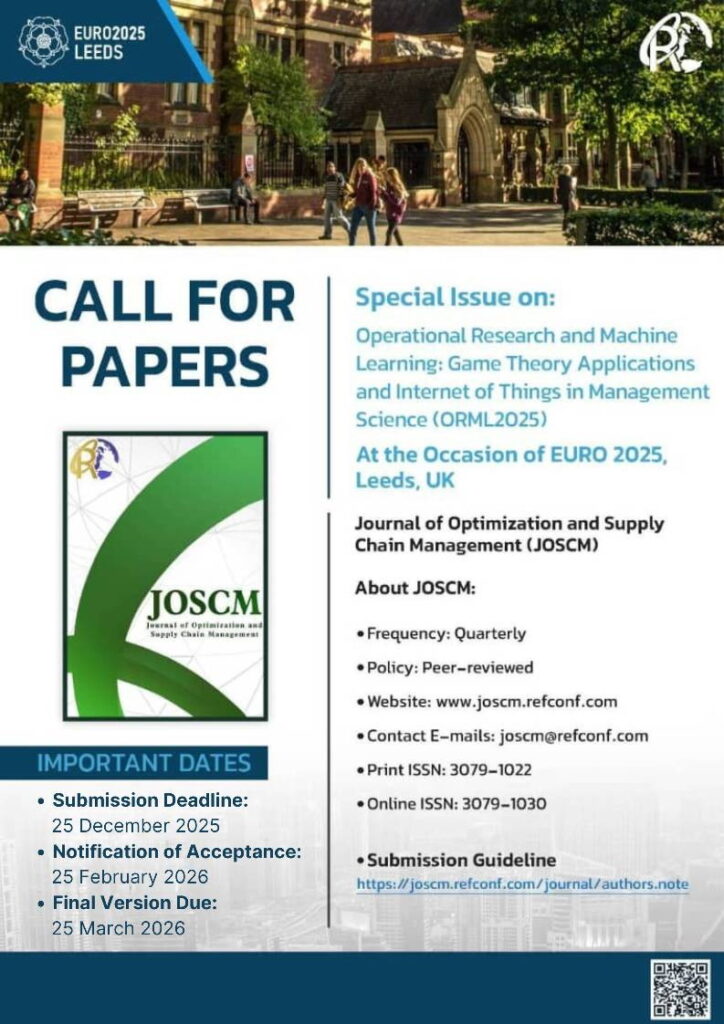Aims and Scope
Traditional research in Operational Research (OR), especially in retail and service management, assumes that the agents behave according to an isolated system structure. OR, as a discipline rooted in mathematical modeling, optimization, and analytical decision-making, continues to provide the backbone for systematic and effective Supply Chain Management (SCM). Recently, the OR literature has experienced a growing interest in using game theory tools to tackle incentive-related problems with multiple agents. Competitors, consumers, retailers, and suppliers are self-interest agents whose actions affect each other benefits and optimal decisions. In such an environment, the decision of the agents affects each agent’s payoff. Therefore, game-theoretic tools can interact with other optimization models to address the problems with multiple agents. By combining the rigor of OR with the adaptability and predictive power of Machine Learning (ML), researchers can develop hybrid frameworks that are not only mathematically sound but also context-aware, scalable, and responsive to dynamic environments. Although game theory has been very well studied in economic literature, there are not many studies practicing supply chains using practical research in game theory. This special issue aims to explore the powerful intersection of OR and ML, with a particular focus on solving real-world Game Theory Applications and Internet of Things (IoT) in Management Science. We particularly welcome contributions that demonstrate the practical applicability and measurable impact of integrated OR-ML approaches in real-world game theory, IoT and supply chain settings.
This special issue is associated at the occasion of the conference EURO 2025 Leeds (https://euro2025leeds.uk) to be held on 22-25 June in University of Leeds, UK, and brings together outstanding research and recent advances in machine learning and their applications in the Game Theory, Internet of Things (IoT), Supply Chain Optimization and Operational Research (OR). We encourage submissions that demonstrate practical impact, methodological advancements, or novel applications of machine learning in supply chain optimization.
Topics of Interest
The topics include but are not limited to:
– Game theoretic application in multi-echelon supply chains.
– Retail management with strategic customers.
– Competitive production scheduling.
– Bargaining in manufacturer-retailer systems.
– Multi-objective optimization.
– Data-driven optimization models for logistics and transportation.
– Predictive analytics for supply chain demand and inventory management.
– Ensemble multi-objective optimization techniques.
– Novel optimization algorithms for coordinating and optimizing decisions in multi-agent
environments.
– Models addressing diverse objectives, capabilities, and interactions among multiple agents.
– Decentralized optimization algorithms and control strategies for distributed systems.
– Hybridization of metaheuristics and machine/deep learning.
– Reinforcement learning for dynamic decision-making in supply chains.
– Learning-based optimization algorithms that improve performance through data feedback.
– Theoretical analysis of the search mechanism through metaheuristic algorithm in machine learning.
– Leveraging machine learning and data analytics to extract insights and patterns for OR applications.
– Case studies showcasing the implementation of ML-OR hybrid models in industry.
– Designing OR models that facilitate seamless interaction and information exchange between human
decision-makers and AI agents.
– OR frameworks capable of dynamically adapting to real-time changes and uncertainties.
– Explainable AI and interpretable ML models for operational decision support.
– Integration of simulation and machine learning in supply chain planning.
– Robust and stochastic optimization under uncertainty using ML techniques.
– Sustainable supply chain strategies enhanced by machine learning.
Submission Guidelines
Please follow the journal style and the guidelines of JOSCM. All authors should submit their paper to the following specific address:
https://joscm.refconf.com/journal/authors.note
Expected Dates Schedule (Important Dates)
Submission Deadline: 25 December 2025
Notification of Acceptance: 25 February 2026
Final Version Due: 25 March 2026
Guest Editors
Dr. Ali Asghar Rahmani Hosseinabadi, University of Regina, Regina, Canada
E-mail: a.r.hosseinabadi1987@gmail.com
Dr. Sara Nodoust, University of Science and Technology, Tehran, Iran
E-mail: sara_nodoust@alumni.iust.ac.ir
Prof. Gerhard-Wilhelm Weber, Poznan University of Technology, Poznan, Poland
E-mail: gerhard.weber@put.poznan.pl
Click image to view poster




